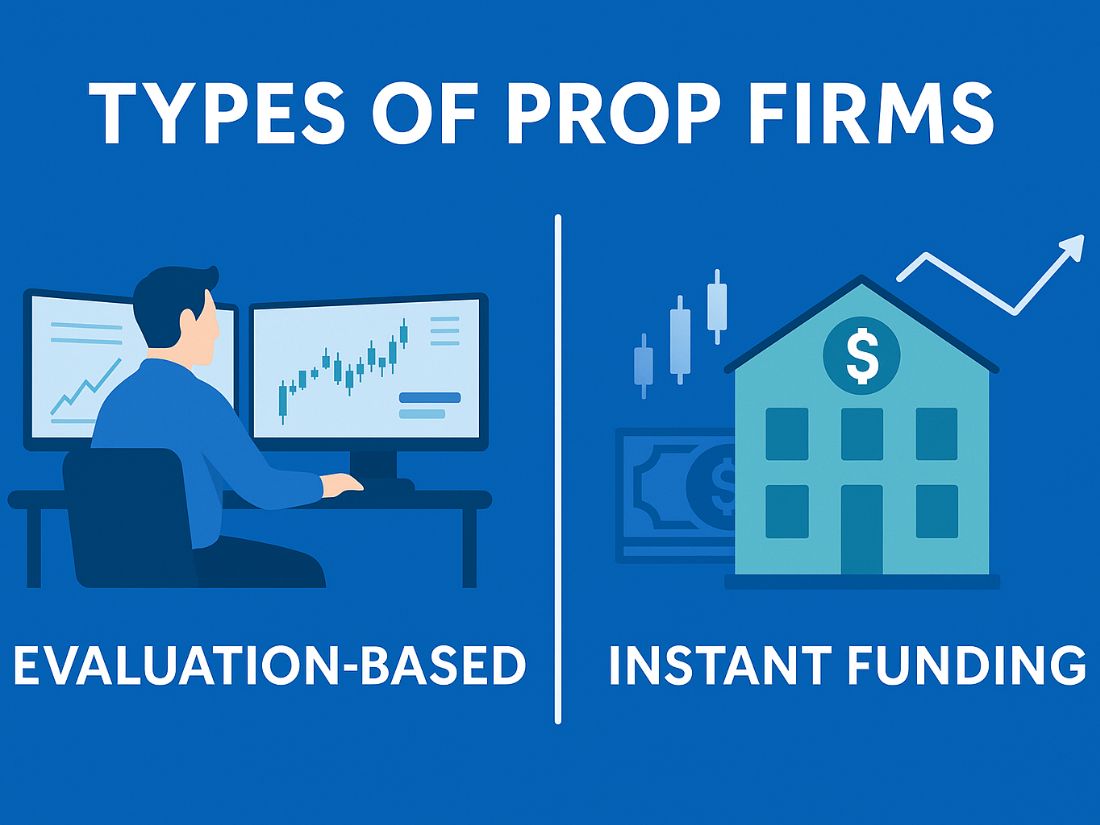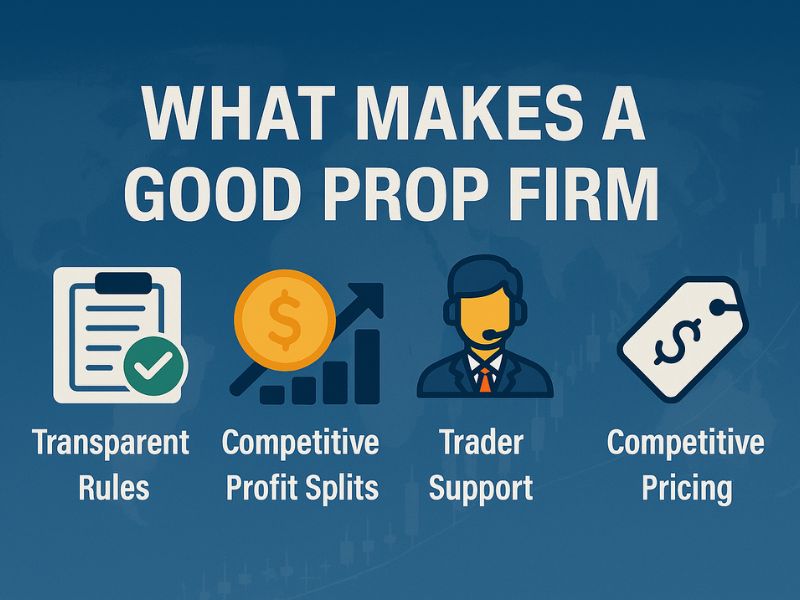Prop firms have become a major point of interest for retail traders looking to trade professionally without putting personal capital at risk. These companies provide access to trading accounts funded with firm capital, under the condition that traders meet defined profit targets while operating within strict risk parameters. For individuals with proven strategies but limited funds, prop firms offer a practical solution to scaling trading operations. This comparison focuses exclusively on reputable and well-established prop firms with a documented history of transparency, timely payouts, and consistent trader support.

Prop Firms: Key Points to Keep in Mind
What Is a Prop Firm?
A prop firm, short for proprietary trading firm, is a company that provides traders with access to the firm’s capital. Traders operate under strict guidelines and, in return, share a portion of the profits they generate. Unlike brokers or investment advisors, prop firms do not manage client accounts or earn commissions from customer trades. Instead, their model revolves entirely around performance-based funding.
The core distinction is that prop firms fund traders to profit from their trading ability, not from providing financial services to external clients. In most retail-accessible setups, the trader pays an access or evaluation fee and must follow clearly defined rules regarding profit targets, drawdowns, and risk exposure. If those conditions are met, the trader receives a share of profits generated from live trading using the firm’s capital.
Types of Prop Firms

Prop firms generally fall into three categories, each with a different approach to funding and trader engagement:
How Prop Firms Make Money
Prop firms operate on a performance-aligned model that generates revenue through several core channels. The most common is the evaluation fee, which traders pay to access a funded challenge. These fees support the firm’s operational costs and help offset losses from failed candidates.
Once traders are funded, firms earn a percentage of the profits generated from live accounts. This profit split typically ranges between 10 and 30 percent, depending on the firm’s structure. It creates an incentive for firms to support capable traders while limiting exposure to underperformers.
In addition to these primary revenue streams, many firms offer paid resets for failed challenges. Some also monetise optional services such as trading tools, analytics platforms, mentorship, or priority customer support. While these services are not mandatory, they contribute to the firm’s bottom line and provide an additional commercial layer.
Key Features and Rules
Most prop firms impose a consistent set of trading conditions that participants must follow in order to qualify for and maintain a funded account. These rules are non-negotiable and form the foundation of the firm’s risk management framework.
What Makes a Good Prop Firm?

Not all prop firms operate with the same level of professionalism. Several distinguishing features separate high-quality firms from those that may pose unnecessary risk to traders.
Red Flags and Risks to Watch For
While many prop firms operate with integrity, others may present serious risks. Traders should remain alert to the following warning signs.

Who Should Consider Joining a Prop Firm?
Prop firms are best suited to traders who demonstrate discipline, consistency, and a strong understanding of risk. These firms are not designed for hobbyists or speculative traders but for those who treat trading as a structured, goal-driven pursuit. Individuals with a defined strategy but limited capital often find the prop firm model especially beneficial.
This funding model offers significant advantages to experienced retail traders and technically proficient individuals who seek to scale their operations without using personal funds. It rewards consistent execution, rule adherence, and effective risk control rather than high-risk behaviour or market speculation.
Traders may find value in prop firms for several reasons:
On the other hand, beginners or traders still testing their strategies are unlikely to benefit. Prop firms typically impose strict drawdown limits and evaluation conditions that can be difficult to navigate without prior experience. Those unwilling to follow firm rules or manage risk within set boundaries are also unlikely to succeed.
For traders who understand that access to capital is earned through precision, not improvisation, prop firms present a serious opportunity. When used responsibly, they can serve as a scalable route to trading professionally without external funding or client-facing obligations.
Frequently Asked Questions
What You Need to Know About Prop Firms
Prop firms offer a structured, rule-based environment where skilled traders can access capital and convert performance into profit. For individuals with proven strategies and strong risk control, they present a practical alternative to self-funding or building a client-facing trading business. The model is particularly well-suited to those who are technically proficient and results-oriented, with a focus on consistency over speculation.
However, entering this space successfully requires more than market knowledge or a profitable trading setup. It demands strict discipline, adherence to clearly defined rules, and a willingness to operate within parameters set by the firm. Many otherwise capable traders fail not because of poor strategy, but because they overlook the operational and behavioural expectations these firms enforce.
Equally important is the selection of the firm itself. The rise in popularity of prop trading has attracted both reputable providers and opportunistic ventures. Traders should prioritise transparency, track record, support infrastructure, and reliability when choosing a firm to work with. Choosing the wrong firm can compromise not only time and capital but also long-term confidence in the model itself.
As the prop trading landscape continues to expand, serious traders should approach the opportunity with realistic expectations and professional standards. In the right hands, a prop firm can be more than just a funding source, it can serve as a platform for sustained, performance-based growth.







